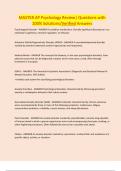MASTER AP Psychology Review | Questions with 100% Solutions /Verified Answers Psychological Disorder - ANSWER A condition marked by a clinically significant disturbance in an individual's cognitions, emotion regulation, or behavior Attention -Deficit/Hyperactivity Disorder (ADHD) - ANSWER A neurodevelopmental disorder marked by extreme inattention and/or hyperactivity and impulsivity. Medical Model - ANSWER The concept that diseases, in this case psychological disorders, have physical causes that can be diagnosed, treated, and in most cases, cured, often through treatment in a hospital. DSM -5 - ANSWER -The American Psychiatric Association's Diagnostic and Statistical Manual of Mental Disorders, Fifth Edition -A widely used system for classifying psychological disorders Anxiety Disorders - ANSWER Psychological disorders characterized by distressing persistent anxiety or maladaptive behaviors that reduce anxiety Generalized Anxiety Disorder (GAD) - ANSWER A disorder characterized by ch ronic excessive worry accompanied by three or more of the following symptoms: restlessness, fatigue, concentration problems, irritability, muscle tension, and sleep disturbance. Panic Disorder - ANSWER An anxiety disorder marked by unpredictable, minutes -long episodes of intense dread in which a person experiences terror and accompanying chest pain, choking, or other frightening sensations. Often followed by worry over a possible next attack Phobia - ANSWER An anxiety disorder marked by a persistent, irra tional fear and avoidance of a specific object, activity, or situation. Social Anxiety Disorder - ANSWER An anxiety disorder involving the extreme and irrational fear of being embarrassed, judged, or scrutinized by others in social situations. Agoraphobi a - ANSWER Fear or avoidance of situations, such as crowds or wide open places, where one has felt loss of control and panic. Obsessive Compulsive Disorder (OCD) - ANSWER A disorder in which repetitive, intrusive thoughts (obsessions) and ritualistic beha viors (compulsions) designed to fend off those thoughts interfere significantly with an individual's functioning. Post Traumatic Stress Disorder (PTSD) - ANSWER A disorder characterized by haunting memories, nightmare, social withdrawal, jumpy anxiety, nu mbness of feeling, and/or insomnia that lingers for four weeks or more after a traumatic experience. Posttraumatic Growth - ANSWER Positive psychological changes as a result of struggling with extremely challenging circumstances and life crises. Major De pressive Disorder (MDD) - ANSWER Psychological disorder involving a significant depressive episode and depressed characteristics, such as lethargy and hopelessness, for at least two weeks. Mania - ANSWER Extremely elevated and excitable mood usually associated with bipolar disorder. Bipolar Disorder - ANSWER Psychological disorder in which the patient experiences both manic and depressed episodes. Rumination - ANSWER Compulsive fretting, o verthinking about our problems and their causes. Schizophrenia - ANSWER A psychological disorder characterized by delusions, hallucinations, disorganized speech, and/or diminished or inappropriate emotional expression Psychosis - ANSWER Loss of contact w ith reality that is severe and chronic Delusions - ANSWER False beliefs, often of persecution or grandeur, that may accompany psychotic disorders Somatic System Disorder - ANSWER A psychological disorder in which the symptoms take a somatic (bodily) form without apparent physical causes Conversion Disorder - ANSWER A disorder in which a person experiences very specific genuine physical symptoms for which no physiological basis can be found. Illness Anxiety Disorder - ANSWER A disorder in which a person interprets normal physical sensations as symptoms of a disease. Dissociative Disorders - ANSWER Disorders in which conscious awareness becomes separated (dissociated) from previous memories, thoughts, and feelings Dissociative Identity Disorder (DID) - ANSWER A rare dissociative disorder in which a person exhibits two or more distinct and alternating personalities Anorexia Nervosa - ANSWER An eating disorder in which a normal -weight person diets and becomes significantly underweight, yet, still feeling f at, continues to starve. Bulimia Nervosa - ANSWER An eating disorder in which a person alternates binge eating with purging, excessive exercise or fasting. Binge -Eating Disorders - ANSWER Significant binge -eating episodes, followed by distress, disgust, or guilt, but without the compensatory purging or fasting that marks bulimia nervosa. Personality Disorders - ANSWER Psychological disorders characterized by inflexible and enduring behavior patterns that impair social functioning Antisocial Personality Disorder - ANSWER -An personality disorder in which a person (usually a man) exhibits a lack of conscience for wrongdoing, even toward friends and family members -May be aggressive and ruthless or a clever con artist Intelligence - ANSWER The mental potential to learn from experience, solve problems, and use knowledge to adapt to new situat ions. Intelligence Test - ANSWER A method for assessing an individual's mental aptitudes and comparing them with those of others, using numerical scores. General Intelligence (g factor) - ANSWER According to Spearman and others, this underlies specific m ental abilities and is therefore measured by every task on an intelligence test. Factor Analysis - ANSWER A statistical procedure that identifies clusters of related items (called factors) on a test; used to identify different dimensions of performance th at underlie a person's total score on a test. Savant Syndrome - ANSWER A condition in which a person otherwise limited in mental ability has an exceptional specific skill, such as in computation or drawing. Emotional Intelligence - ANSWER The ability to perceive, understand, manage, and use emotions. Mental Age - ANSWER A measure of intelligence test performance devised by Binet; the chronological age that most typically corresponds to a given level of performance. Intelligence quotient (IQ) - ANSWER -Defined originally as the ratio of mental age (ma) to chronological age (ca) multiplied by 100 (thus, IQ=ma/ca x 100)




